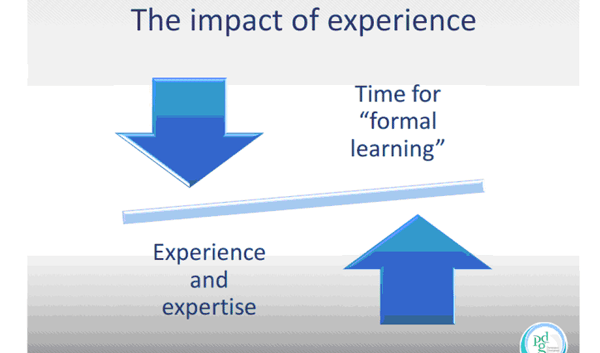- corporate
- Blog post
Why Informal Learning is Crowding Out Formal Learning
I saw an interesting graphic (the one on the right) from a presentation by Professional Development Group. It shows that as we become more experienced, we’re less likely to engage in formal learning. Pretty intuitive, right?
It was probably always true. But in the past decade it’s become more important to build any learning experience around the assumption that formal learning may be giving way to informal learning, especially in soft-skills areas with more experienced employees. A few reasons:
- We’re pressed for time. I know, we were busy 20 years ago, too. But not as busy as today. Lean organizations. Multi-tasking. Changes in lifestyle such as dual wage earners. We don’t just feel busier; we are.
- Digital natives — Millennials who graduated college in 2000 or after – do everything on computers. Stands to reason they’ll want to learn on computers as well. And they want to do it informally – when they want it, where they want it.
- Search engines have taught us to expect “solutions in the moment of need.” David Carr, in his book, “The Shallows: What the Internet Is Doing to Our Brains,” argues that computers have changed the way our brains work. In particular, our attention spans have shortened and we’ve become remarkably impatient. This is certainly true of Millennials, but it’s also true of Gen Xers and Boomers. As a result, in all areas of our lives, including training, we tend to want instant solutions. Which are impossible to deliver in formal training events. They can only be delivered informally.
- And finally, our brains are saturated. The PDG presentation cited Carnegie Mellon professor Robert Kelley’s famous study about how much information the average knowledge worker can retain when doing his or her job.
So, if we can’t cram as much learning into our workers’ brains as we could a quarter century ago, what’s that mean? Chief Learning Officer magazine wrote, “This research strongly challenges a learning program that bases a vast amount of its efforts on knowledge transfer. Taking a look at most formal learning programs, many learning departments might find that even with the best of intentions, they might not meet their audience’s needs.” (CLO, 6/22/07).
Formal training will always have its place. But we’re definitely moving away from it as the centerpiece of a learning program. If we’re serious about developing our people, we need to look beyond formal learning and start exploring collaborative learning, e-learning, mobile learning, social media, peer learning and other opportunities for workers to learn informally.

Get a demo of all our training features
Connect with an expert for a one-on-one demonstration of how BTS Total Access can help develop your team.



